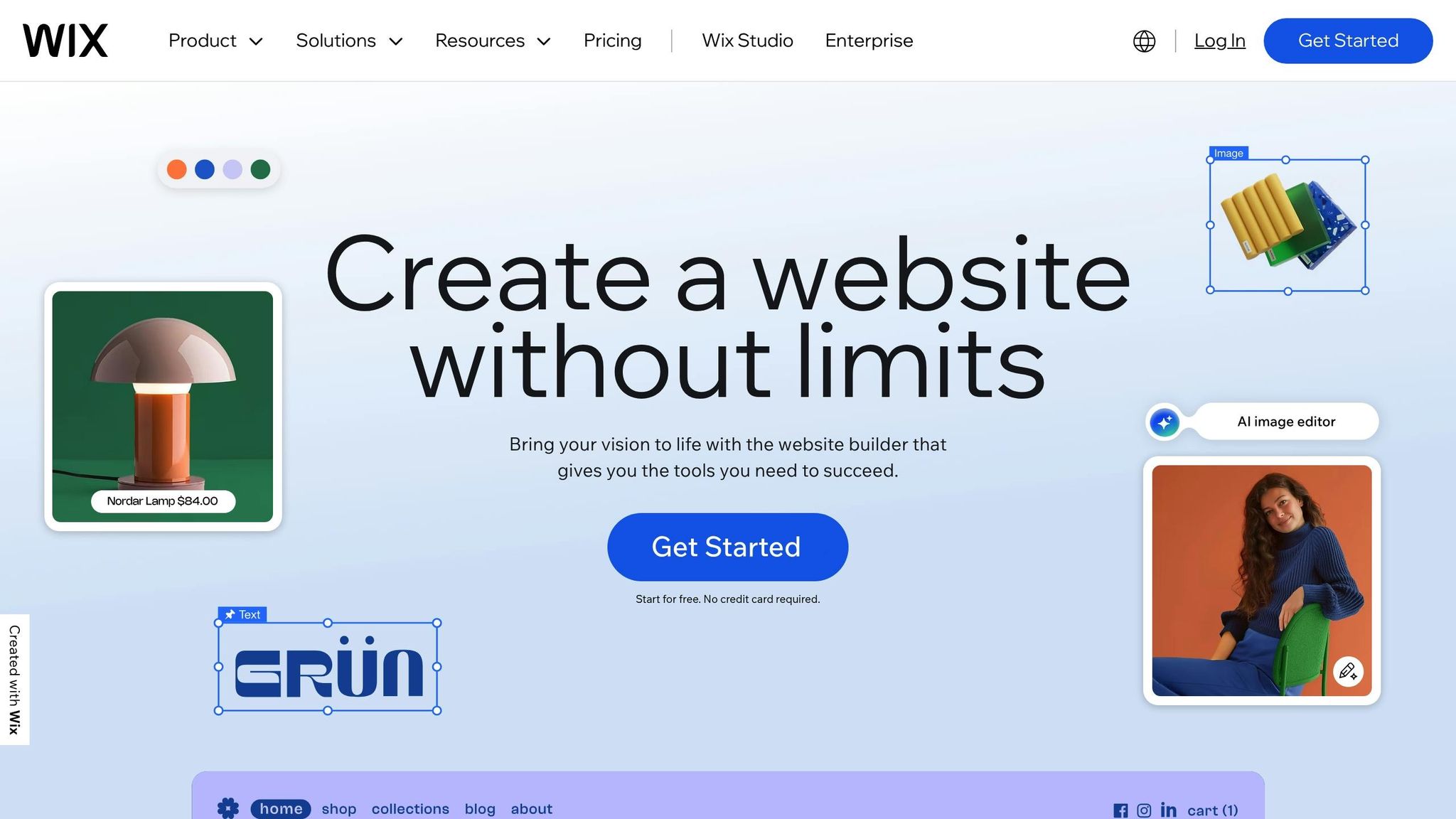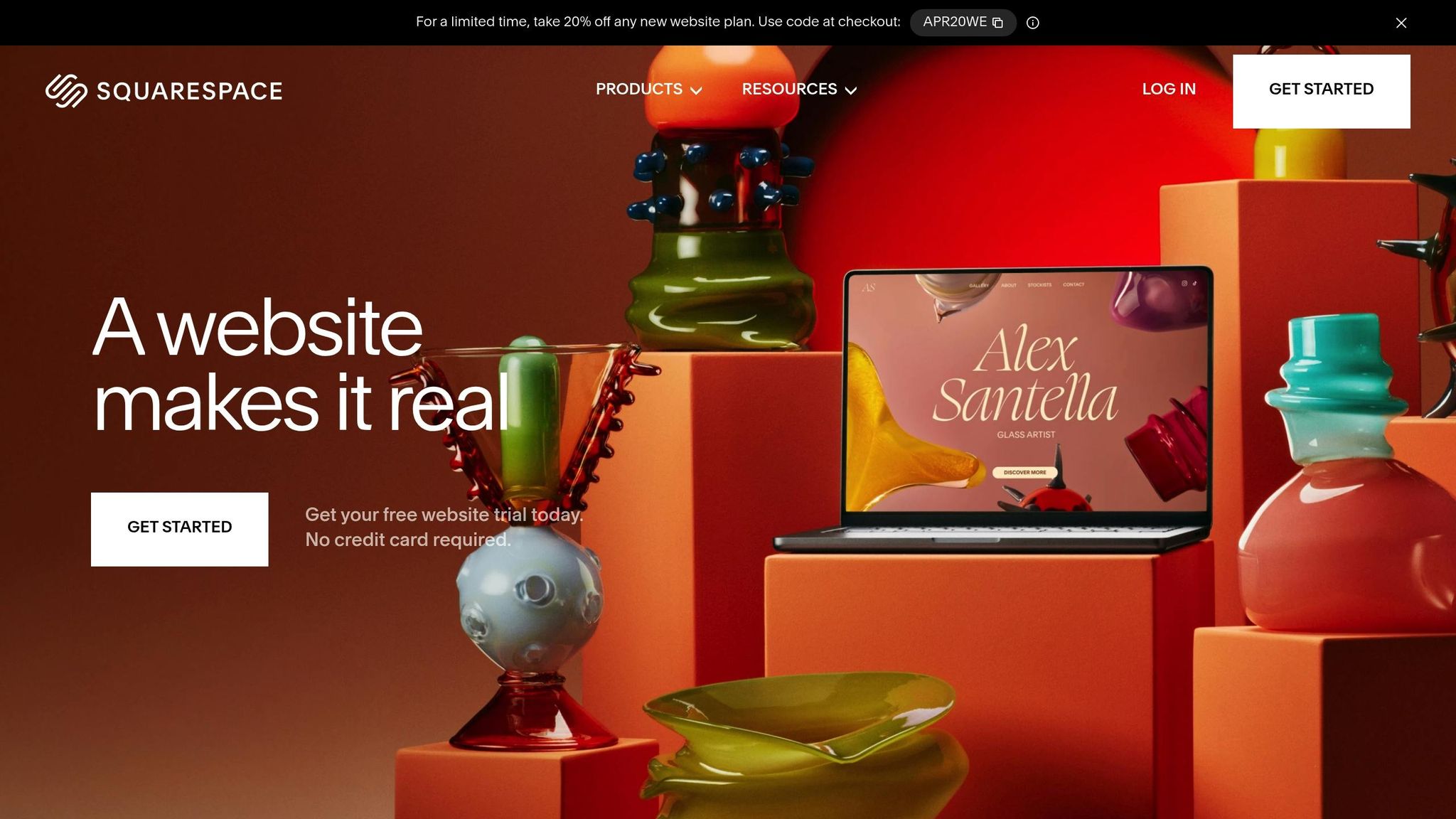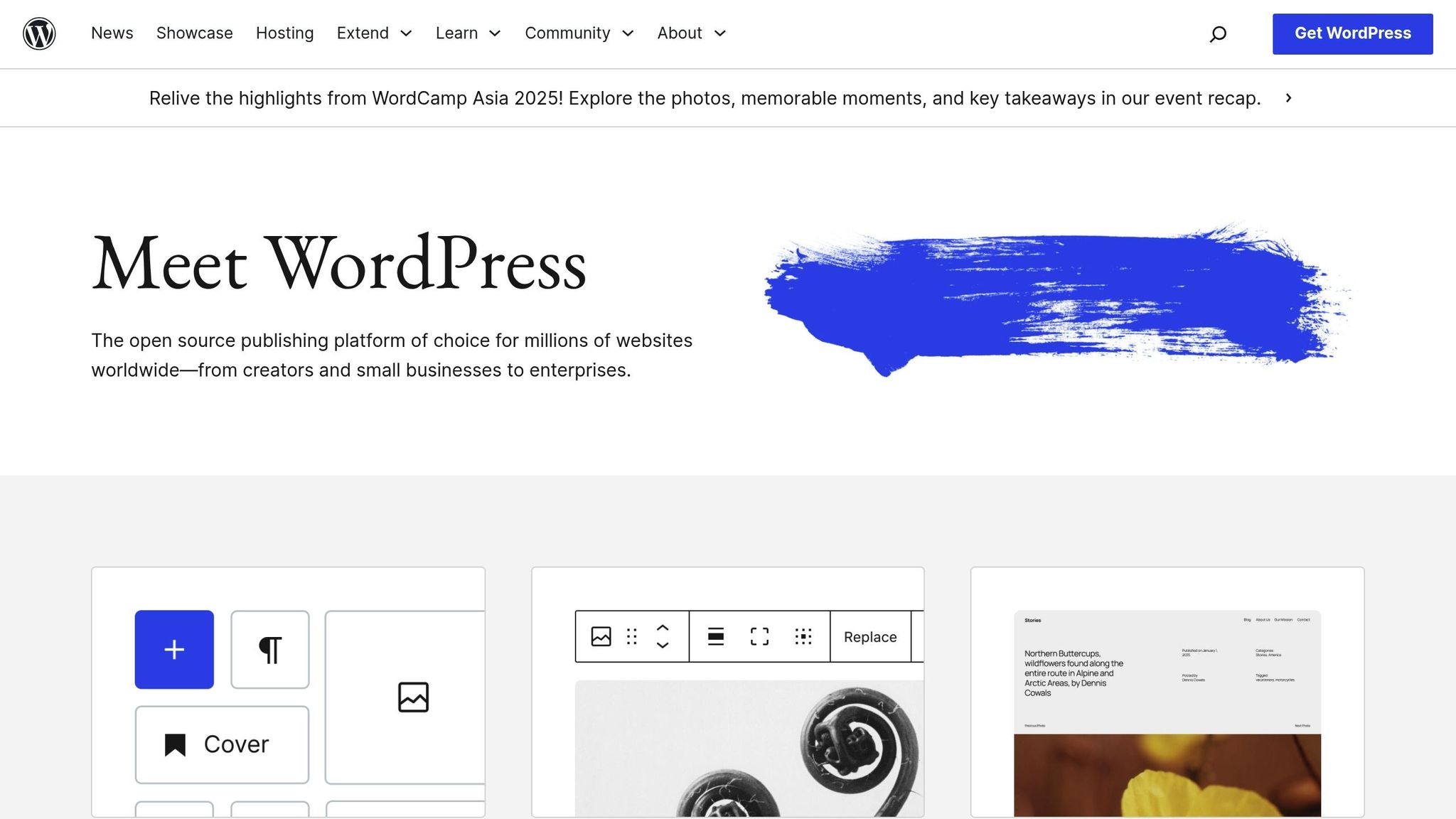Choosing the right website platform can make a big difference in how your local business shows up online. Whether you're running a coffee shop, law office, or retail store, your website should be easy to manage, look polished, and help customers find you. With so many options out there—Shopify, Wix, Squarespace, WordPress—it’s not just about features. It’s about picking a platform that fits your goals, your budget, and how hands-on you want to be.
Here's a quick breakdown of the top platforms:
- Shopify: Best for e-commerce with advanced tools for online and in-store sales. Plans start at $19/month.
- Wix: Great for beginners with its drag-and-drop editor and local SEO tools. Plans start at $17/month.
- Squarespace: Ideal for portfolios and professional-looking websites. Plans start at $16/month.
- WordPress: Offers unmatched customization and local SEO plugins but requires more hands-on management. Basic setup is free, with hosting costs around $10–$50/month.
Quick Comparison
| Platform | Starting Cost | SEO Features | E-commerce Focus | Ease of Use | Ideal For |
|---|---|---|---|---|---|
| Shopify | $19/month | Advanced | Primary | Moderate | Retailers and online stores |
| Wix | $17/month | Beginner-friendly | Add-on | Easy | Small businesses, beginners |
| Squarespace | $16/month | Basic | Add-on | Easy | Portfolios, service businesses |
| WordPress | Free (hosting $10–$50) | Customizable | Add-on (plugins) | Moderate | Custom sites, local SEO |
Key Takeaway
For e-commerce, go with Shopify. For simple, affordable websites, Wix or Squarespace work well. If you want full control and advanced SEO, WordPress is your best option.
1. Shopify

Shopify equips local businesses with tools that seamlessly connect online and in-store operations. Its integrated POS system supports both e-commerce and physical retail, making it a versatile option for different business models.
Shopify offers more than just pricing tiers. Its built-in SEO tools, like automatic sitemap.xml generation, improve local search visibility. Steve Pogson from First Pier highlights this feature as a key contributor to better online visibility. Shopify also includes abandoned cart recovery, which achieved impressive results - 41.18% open rates and 9.50% click-through rates - leading to over $60 million in sales within three months.
Security is another priority for Shopify.
"Shopify's PCI compliance covers all six categories of the PCI standards."
This ensures every transaction is secure, building customer trust.
For businesses serving diverse communities, Shopify’s multilingual and currency conversion features allow customers to shop in their preferred language and currency. Pogson stresses that maintaining optimization across all languages is crucial for success.
Shopify’s analytics tools provide detailed insights into sales trends, customer behavior, and product performance. These insights help businesses make informed decisions to refine their strategies. If you need support identifying what’s working and what’s not, our ecommerce consultancy team can provide tailored recommendations.
Social media integration further expands Shopify’s capabilities.
Finally, Shopify’s 24/7 customer support ensures technical issues are resolved quickly, minimizing disruptions to your business.
2. Wix

Wix makes building a website simple for local businesses. With over 900 free templates sorted by industry, businesses can quickly create a professional site while keeping full control using the platform's drag-and-drop editor.
Here’s a breakdown of Wix's pricing plans and features:
| Plan | Monthly Cost | Storage | Key Features |
|---|---|---|---|
| Light | $17 | 2GB | Basic marketing tools, Ad-free |
| Core | $29 | 50GB | Online store features, Basic analytics |
| Business | $36 | 100GB | Advanced e-commerce, Multi-currency support |
| Business Elite | $159 | Unlimited | VIP support, Advanced analytics |
Wix shines when it comes to local SEO. Research shows that organic and local SEO drive 67% of website revenue. Wix helps businesses boost their local search visibility by automatically adding local business markup when you input your business details.
To help businesses engage with local customers, Wix includes tools like:
- A built-in email marketing suite
- Social media integration
- Appointment scheduling with Wix Bookings
- Google Business Profile integration
Wix also prioritizes security, offering free SSL certificates and PCI compliance to protect sensitive customer data - critical for local businesses.
The platform ensures your site works well across all devices with mobile-friendly designs. However, keep in mind that templates are fixed once chosen, and some users report slower loading speeds at times.
3. Squarespace

Squarespace helps local businesses establish a professional online presence. Its streamlined code structure makes it easier for search engines to crawl and index websites, boosting search visibility.
Squarespace Pricing
| Plan | Monthly Cost |
|---|---|
| Basic | $16 |
| Business | $23 |
| Commerce Basic | $27 |
| Commerce Advanced | $49 |
One of Squarespace's standout features is its mobile responsiveness. Every template adjusts automatically to look great on any device, ensuring a consistent user experience across screens.
For local SEO, Squarespace includes built-in tools to edit page titles, meta descriptions, and set up redirects - key elements for improving website visibility.
The platform supports up to 1,000 pages and integrates with Google Analytics, giving users valuable insights into visitor behavior. These analytics can help businesses refine their local marketing strategies.
Squarespace also prioritizes security. Features like SSL encryption, regular updates, and data backup and recovery ensure a safe online environment for users.
However, there are some limitations. Template customization options are somewhat restricted, its e-commerce features may not suit complex retail needs, and the range of third-party integrations is limited.
With its drag-and-drop interface and mobile app, managing a site is straightforward, allowing business owners to focus on their main operations. This overview highlights Squarespace's key features and areas where it may fall short.
4. WordPress

WordPress powers over 43% of websites worldwide, offering flexibility and tools that make it a strong choice for local businesses looking to improve their online presence.
Core Features and Pricing
| Feature Category | Details |
|---|---|
| Hosting Type | Self-hosted |
| Basic Setup Cost | $0 (platform only) |
| Typical Monthly Costs* | $10–$50 |
| Technical Expertise | Low to Moderate |
| SEO-Ready | Yes, built-in |
*Costs depend on your hosting provider and any premium plugins or themes you choose.
These features make WordPress a capable platform for businesses aiming to enhance their SEO and local visibility.
Built-in SEO Benefits
WordPress is designed to boost search rankings with clean code and customizable permalinks. Add-ons like the Yoast SEO plugin make it even easier to optimize your site for search engines.
Features for Local Businesses
WordPress's plugin ecosystem offers tools specifically designed for local businesses:
- Integration with Google My Business
- Interactive maps and location-specific pages
- Schema markup for business details like hours and location
- Customer review displays
- Mobile-friendly designs
These tools help businesses connect with their local audience, but regular upkeep is necessary to ensure everything runs smoothly.
Maintenance Requirements
To keep your WordPress site performing well, you’ll need to handle tasks like:
- Updating themes and plugins
- Monitoring performance with Google Search Console
- Compressing images for faster loading
- Organizing URLs and taxonomies for better structure
Data Ownership and Security
Unlike hosted platforms, WordPress gives you full control over your website and its data. This includes everything from customer information to e-commerce transactions and marketing content.
With regular security updates and a large community for support, WordPress provides a secure and dependable environment for local businesses looking to grow online. This level of control makes it a strong choice for businesses aiming for long-term success.
Platform Strengths and Limitations
Let’s break down the main capabilities and drawbacks of each platform, focusing on key features that matter for businesses.
Comparative Analysis
| Feature | Shopify | Wix | Squarespace | WordPress |
|---|---|---|---|---|
| Starting Cost | $19/month | $17/month | $16/month | Free (platform) |
| Typical Monthly Costs | $49–299 | $29–159 | $23–52 | $10–50 |
| Technical Expertise | Moderate | Low | Low | Low to Moderate |
| E-commerce Focus | Primary | Add-on | Add-on | Add-on (via plugins) |
| SEO Capabilities | Advanced | Beginner-friendly | Basic | Customizable |
| Local Business Tools | Strong | Good | Good | Excellent |
Local Marketing Capabilities
WordPress leads the pack in local marketing, thanks to its plugins and integration with tools like Google Business Profile. Shopify includes features like inventory management and store locators for local retailers. Wix and Squarespace offer local business tools but often rely on third-party integrations to expand their functionality.
Key Considerations
Each platform caters to different priorities:
- Scalability and Marketing: Shopify supports business growth with advanced marketing tools, while WordPress allows for deep customization. Wix and Squarespace are better suited for smaller businesses with straightforward needs.
- SEO Features: Shopify provides advanced SEO options, WordPress offers flexibility through plugins, and Wix simplifies SEO for beginners.
Technical Requirements
- Shopify: Requires some technical knowledge.
- Wix and Squarespace: Easy to use, with minimal technical skills needed.
- WordPress: Highly flexible but comes with a steeper learning curve.
Your choice depends on your technical skills, budget, and business growth plans. Use this comparison to pinpoint the platform that aligns with your goals.
Choosing the Right Platform
When selecting the best website platform for your business, it’s important to consider factors like SEO tools, e-commerce features, and ease of use. Each platform has its strengths, and matching those to your business needs can make all the difference.
For local service businesses such as consulting firms, law offices, or restaurants, Wix and Squarespace are great choices. Their easy-to-use interfaces and built-in appointment management tools stand out. If you run a small retail store, Wix offers an affordable and straightforward solution. For more advanced e-commerce needs, Shopify provides powerful inventory management and online selling tools. Community organizations often prefer WordPress because of its flexibility and ability to support local SEO efforts.
Here’s a quick breakdown to help you decide:
| Business Type | Recommended Platform | Why It Works | Monthly Investment |
|---|---|---|---|
| Professional Services | Squarespace | Sleek templates and portfolio-friendly features | $16 |
| Small Retail (Basic) | Wix | Simple product catalog and budget-friendly | $17 |
| Small Retail (Advanced) | Shopify | Strong e-commerce and inventory tools | $19 |
| Community Organizations | WordPress | Highly customizable with local SEO benefits | Free (plus $10–$50 hosting) |
| Beginners/Limited Budget | Wix | Affordable and easy for first-time users | $17 |
Key Considerations
- SEO Matters: Local search results account for 33% of clicks in Google’s "local pack", so platforms with strong SEO tools should be a priority.
- Budget-Friendly Options: For businesses looking to save, Wix and Squarespace strike a good balance between features and cost.
- Ease of Use vs. Features: Platforms like Wix and Squarespace are easier to use, while Shopify and WordPress offer more advanced capabilities for those comfortable with a steeper learning curve.
Choosing the right platform depends on your specific needs and goals, but this guide can help narrow down the best fit.
